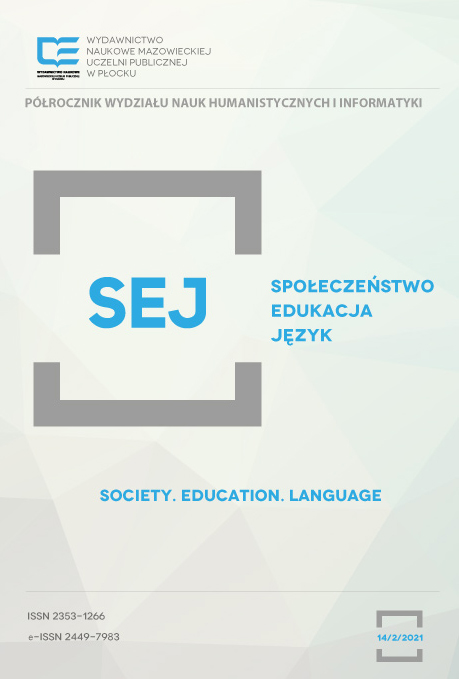DISTANCE EDUCATION. THE GRASSROOTS STRENGTH OF DETERMINED ENTHUSIASTS OR CAREFULLY DEVELOPED SYSTEM SOLUTIONS. THE COVID-19 PANDEMIC IN POLISH EDUCATION
DOI:
https://doi.org/10.19251/sej/2021.14.2(6)Keywords:
COVID-19, e-learning, m-learning, b-learning, distance education, didactics, pandemic, schoolAbstract
Remote learning changes the approach to school and out-of-school education and affects all levels of education. So far (before the covid-19 pandemic - coronavirus), it was the domain of enthusiasts and people who saw in it additional strength, an element supporting education. Of course, pure remote and e-learning forms have triumphed in corporate solutions related to training and courses. Higher education institutions and primary and secondary education used remote elements very rarely. Even hybrid, mixed forms, called complementary (b-learning), were rather a kind of novelty in the activities of teachers and lecturers. An important element of considerations on school and academic e-learning is what we used to call grassroots force, it was the involvement of enthusiasts discovering the secrets of e-learning platforms in front of their pupils and pupils, students. A decade ago, in surveys, students talked about their need to weave remote support into traditional education. Experts, academics, carrying out their classes via the platforms suspected a gradual tilting of the school scales towards b-learning. Observing the changes taking place in school over the decade, we can honestly say that these were rather sham movements, unable to change the class-lesson system, and especially those of its elements that burdened all of us, the subjects of the educational process. So what happened, what powers changed school and academic education, that we found ourselves in the digital world, we started using mobile solutions, we can conduct online classes? And can we actually? Is this change a necessary evil, or an opportunity for tomorrow, for universities, schools, pupils, students, lecturers and teachers - and therefore for modern, changing but constantly learning societies?
References
• Allen, I. Elaine, Seaman, Jeff. 2009. Learning on Demand – Online Education in the United States. Printed in the United States of America: Babson Survey Research Group, United States of America
• Andersen, Hans Christian. 2011. Baśnie. Królowa śniegu. Poznań Wydawnictwo G&P
• Baudrillard, Jean. 2005. Pakt jasności. O inteligencji zła, Warszawa: Wydawnictwo Sic!
• Canipe, Simon 2012. 5 K-12 E-Learning Trends, “The Journal”.http://gsehd.gwu.edu/documents/ Dostęp: 15.08.2021)
• Christoff, Monika, Wawrzyniak Sonia 2020. Społeczno-edukacyjny potencjał szkoły a rynek pracy. Poznań, Wydawnictwo Naukowe UAM
• Cybal-Michalska, Agnieszka. 2019. Młodzież akademicka a świat „bezgranicznych karier, [w:] Cybal-Michalska, Agnieszka. 2019. Młodzież jako podmiot i przedmiot badań pedagogicznych, Poznań Wydawnictwo Naukowe Akademii WSB
• Cybal-Michalska, Agnieszka. 2019. Młodzież jako podmiot i przedmiot badań pedagogicznych, Poznań Wydawnictwo Naukowe Akademii WSB
• Guri-Rosenblit Sarah. 2005. Distance education’ and e-learning: not the same thing, „Higher Education”, 49, 4
• Harasim Linda. 2000. Shift happens: online education as a new paradigm in learning, „Internet and Higher Education” vol. 3, 1–2, http://www.scopus.com/record/display.url?eid=2s0034441727&origin=inward&txGid=da38HzqKYnGFX4qnzux43ia%3a2. Dostęp: 12.07.2021
• Harasim, Linda, Fraser Simon. On online collaborative learning, http://www.slideshare.net/aquifolium/lindaharasim-on-online-collaborative-learning, Dostęp: 20.07.2021
• Ingarden, Roman.1972. Książeczka o człowieku, Kraków: Wydawnictwo Literackie
• Lem, Stanisław Pan Cogito przed monitorem, [w:] Polityka.pl kultura, http://www.polityka.pl/kultura/ludzie/175231,1,lem-stanislaw.read. Dostęp: 22.08.2021.
• Leszkowicz Mateusz. 2020. Czytanie informacyjne. Infografiki w procesach poznawczych. Wydawnictwo Naukowe UAM
• McLuhan, Marschall. 1964. Understanding Media. https://www.persee.fr/doc/homso_0018-4306_1967_num_5_1_3099. Dostęp 20.08.2021
• Mickiewicz, Adam, 1922. Ballady i Romanse. Romantyczność, , Krakowska Spółdzielnia Wydawnicza, Kraków. https://wolnelektury.pl/media/book/pdf/ballady-i-romanse.pdf. Dostęp 20.08.2021.
• Mischke, Jerzy. Dylematy współczesnej edukacji: nauczanie tradycyjne czy zdalne, http://galaxy.uci.agh.edu.pl/~mischke/upload/File/artykoly/Dylematy_wspolczesnej_edukacji.pdf. Dostęp: 02.07.2021
• Postman, Neil. 2004. Technopol. Triumf techniki nad kulturą, Warszawa: MUZA
• Przybyła, Mariusz, 2020. Szkoła „złowiona” we własne sieci – rzecz o kształceniu tradycyjnym i komplementarnym w obliczu pandemii koronawirusa Covid19, [w:] Christoff, M. Wawrzyniak S. Społeczno-edukacyjny potencjał szkoły a rynek pracy. Poznań, Wydawnictwo Naukowe UAM
• Przybyła, Mariusz. 2012. Kształcenie zdalne w szkole wyższej, stan i perspektywy, Poznań. http://hdl.handle.net/10593/2898
• Tokarczuk, Olga. 2019. Przemowa noblowska Olgi Tokarczuk, "Czuły narrator", Sztokholm
